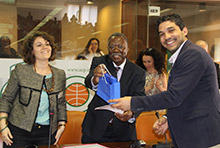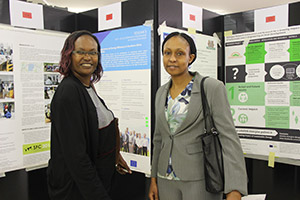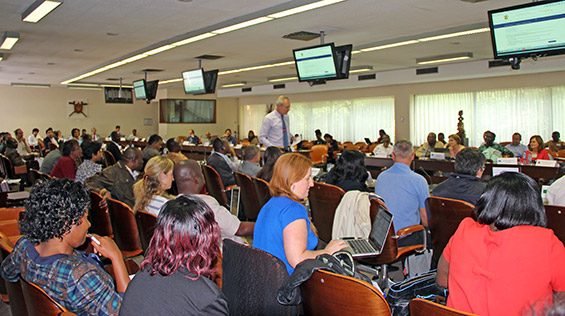Joint conference zooms in on lessons, best practices in ACP-EU higher education, research programmes
 Brussels, 6 July 2016/ ACP: A Joint Stakeholders’ Conference held on 5-6 July at ACP House gathered beneficiaries and stakeholders of three Intra-ACP flagship programmes in the higher education, science and technology and research sectors, under the ACP-EU partnership.
Brussels, 6 July 2016/ ACP: A Joint Stakeholders’ Conference held on 5-6 July at ACP House gathered beneficiaries and stakeholders of three Intra-ACP flagship programmes in the higher education, science and technology and research sectors, under the ACP-EU partnership.
In all, around 200 projects financed since 2012 under through ACP-EU EDULINK II, ACP Science and Technology Programme II and ACP Caribbean & Pacific Research Programme for Sustainable Development have worked together to promote access to knowledge, strengthen skills and capacities, and foster innovation, with the ultimate aim of boosting resilience and economic growth in African, Caribbean and Pacific countries.
The purpose of this week’s conference was to provide a space for information-driven analyses and thoughtful exchange of ideas by those involved in these projects, in order to leverage good practices and knowledge experiences, create linkages and bring about better outcomes for ACP populations.
“Knowledge development and innovation requires financial investments. ACP institutions need to devise innovative funding mechanisms to meet the challenges of research, development and innovation,” said ACP Assistant Secretary General Mr. Henrique Banze, in opening the event.
“It is important to note that in effectively addressing the development challenges in ACP countries, multi-sectoral and inter-disciplinary interventions that constantly employ new understandings and technologies, should be integrated in the respective national and regional development strategies.”
A large variety of organisations participate in the programmes, with a substantial interest amongst academic and scientific communities.
For example, EDULINK II supports 47 grant projects worth €22.5 million in total in two target sectors – agriculture and food security, and energy. Under EDULINK II, projects such as L3EAP – Lifelong learning for Energy Security, Access and Efficiency in African and Pacific Small Island States – links universities in Fiji, Mauritius and Papua New Guinea with the Hamburg University of Applied Sciences in Germany, to strengthen their capacity to provide high level skills and training required for the energy labour market.
The ACP Science & Technology II Programme has a total allocation of €20.8 million financing 36 projects covering the majority of ACP countries. One example is the WABEF project (Western Africa Biowastes for Energy and Fertilizer), which links institutions in Benin, Mali, Senegal, France and the Netherlands to assess technologies for recycling agricultural and agro-industrial biowastes into energy and fertilisers, with local applications relevant to the Sudano-Sahelian region.
Finally, the ACP Caribbean & Pacific Research Programme for Sustainable Development promotes applied research in the fields of agriculture, water sanitation, energy and climate change with a total allocation of €20 million spread over ten projects. It includes initiatives such as GoLoCarSce – Global Local Caribbean Climate Change Adaptation and Mitigation Scenarios – which links four Caribbean institutions led by the University of the West Indies, with the Stockholm Environment Institute in Sweden to examine medium to long-term effects of climate change based on projected impacts on human health, water availability, forest biodiversity, agriculture and coasts.

The Joint Stakeholders Conference highlighted lessons learned from the field, successes and challenges in the projects, future perspectives and funding opportunities. More than 20 presentations focused on projects, both on agriculture and food security as well as energy access and efficiency.
Head of Unit at the European Commission’s DG DEVCO Ms. Beata Kolecka, emphasised the importance of the conference for the promotion of science and technology in ACP developing countries: “I understand how vital research, technology and innovation, knowledge and skills are for sustainable development – economic, social and human. The 2030 Agenda for Sustainable Development has recognised for the first time, at this level, the role of science, technology and innovation as a vital driver of sustainability.”
EDULINK II, ACP Science & Technology Programme II and the ACP Caribbean and Pacific Research Programme for Sustainable Development are financed by the European Union and implemented by the ACP Secretariat.
(Photos from top: ACP Secretariat representative Dr. John Kakule (centre) gives out prizes for participants at the Joint Stakeholders' Conference; Participants from around Africa, Caribbean, Pacific and the EU joined the discussions; Conference in session at the ACP House in Brussels.)
– ACP Press
For more information visit:

